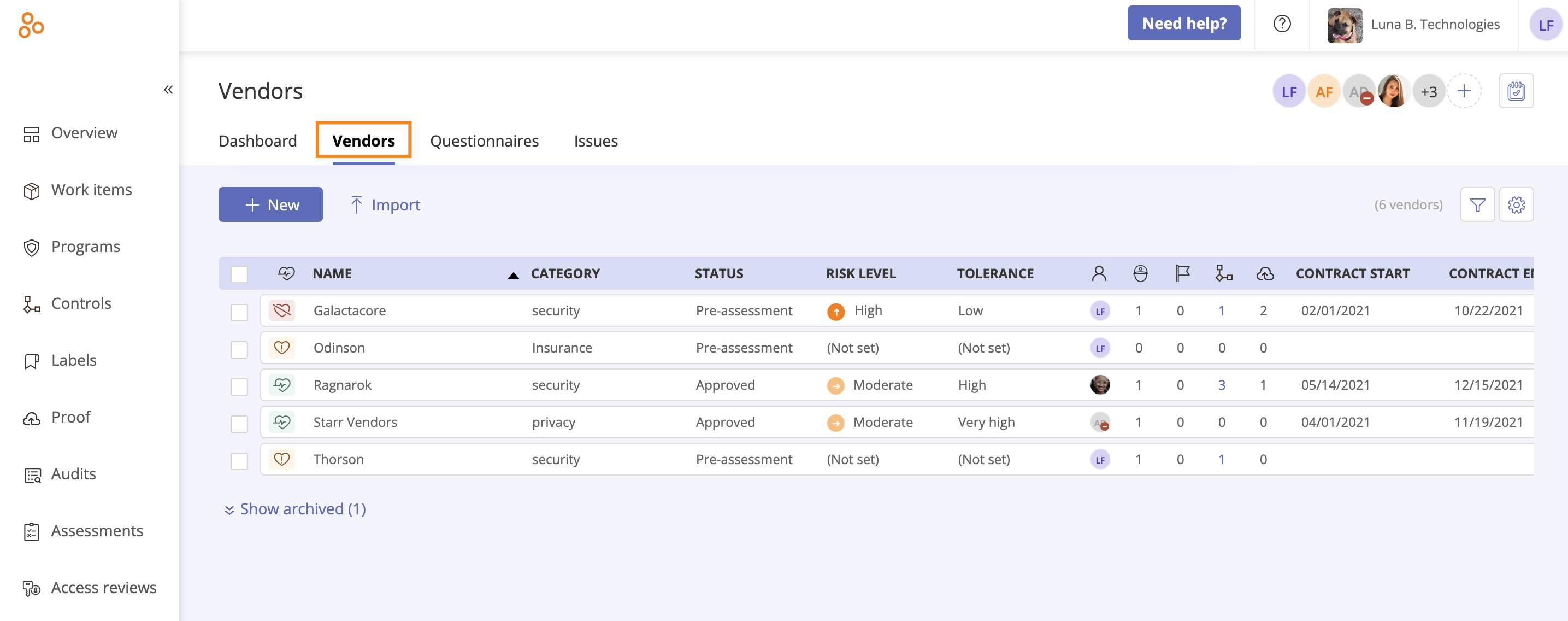Importing vendors
Roles and permissions
The following roles can import vendors:
Administrators who are members of the Vendor Register
Compliance managers who are members of the Vendor Register
Users who are members of the Vendor Register
If your organization has already developed a list of vendors, you can import them into Hyperproof.
Tip
For more information, see the Importing vendors video at the bottom of the page.
Tip
Adding additional information does not overwrite existing data. During the import, Hyperproof searches for any exact data identifiers. If it doesn’t find any, it treats the data as new. If it finds a match, it updates the existing data.
Step One: Downloading the example CSV
The easiest way to start importing your vendors is by downloading Hyperproof's example CSV. The example CSV provides the exact template for successfully importing vendors into Hyperproof.
From the left menu, select Vendors.
Select the Vendors tab, and then click Import.

The Import vendors window opens.
Click Download the example CSV.
Step Two: Editing the CSV
Replace the contents of the example CSV file with your vendors. Be sure to follow the format of the example file, as well as the instructions on the page, to ensure that your vendors can be successfully imported.
Note
The CSV must contain ALL headings listed below, even if they are optional. Keep in mind that headings are case-sensitive!
Heading | |
|---|---|
Name | This is the name of the vendor. This field is required. Tip: Vendor names must be unique. |
Category | Used to group related vendors. This is an optional field. |
Status | A field for tracking the vendor's status in your organization. This is an optional field. |
Tolerance | The level of risk the vendor poses to your organization should something go wrong. This is an optional field. |
Owner | Must be formatted as FirstName LastName (email address), i.e. Jennifer Cook (jcook@lunabtechnologies.org). This is an optional field. Tip: If no vendor owner is provided, the vendor is assigned to the individual who imports the CSV. Additional tip: The owner's email address must match the email address they use to sign in to Hyperproof. Additional tip: Contacts can also be vendor owners. |
Group | The group the request is assigned to. This is an optional field. Tip: The group must already exist in your organization. Additional tip: Ensure group names are spelled exactly as they are in Hyperproof. |
Vendor contacts | A field for your main vendor contact or contacts. Must be formatted as FirstName LastName (email address) or "FirstName LastName (email address), FirstName LastName (email address)" for multiple contacts. Be sure to include the quotation marks when sending to multiple contacts. This is an optional field. |
Contract start date | A field for when your organization entered into a contract with the vendor. This is an optional field. NoteDates on imported records are parsed based on the date formats associated with your locale. If no valid date can be determined, Hyperproof displays an error. See Data interpreted by browser locale for a list of supported locales. |
Contract end date | A field for when your vendor contract expires. This is an optional field. NoteDates on imported records are parsed based on the date formats associated with your locale. If no valid date can be determined, Hyperproof displays an error. See Data interpreted by browser locale for a list of supported locales. |
Maps to risks | A field for linking a risk to a vendor. This is an optional field. Tip: If mapping multiple risks to a vendor, enter the risk IDs in a comma-separated format, i.e. R-AC-1, R-AC-2, R-AC-3. |
Maps to controls | A field for linking a control to a vendor. This is an optional field. Tip: If mapping multiple controls to a vendor, enter the control IDs in a comma-separated format, i.e. CC3.1.1, CC3.2.5, CC3.3.4. |
Custom fields | If you find that you need specific fields for vendors beyond the standard fields provided, create custom fields and link them to the vendor object. Note that when creating a custom field, you can choose the multiple-select field type, which allows you to select and store multiple values for a single field. For example, if you want to track multiple products for a vendor, a multiple select custom field is a good solution. |
Below is a snippet of a sample import file.

Step Three: Importing the CSV
After you’ve made the necessary changes to the CSV, it can be imported into Hyperproof.
Drag and drop the CSV file into the Upload CSV File field, or click Select file to upload to upload it manually.
Click Import.
Hyperproof checks the CSV to ensure that there are no errors. You’ll be alerted if Hyperproof encounters any errors.
If Hyperproof didn’t detect any errors, click Next. If Hyperproof detected errors, do one or both of the following:
First, use the Error viewer to identify the errors. Second, correct the errors directly in the CSV. This ensures that the CSV is up-to-date should you need to re-import in the future.
Tip
Use the forward and backward arrows to cycle through the errors. The Error viewer gives specific information on what needs to be corrected.
Remove rows that contain errors by clicking Remove all rows with errors. Note that this doesn't remove any data in the actual CSV.
Click Next.
The CSV is imported.
Importing vendors video
Watch this short video to learn more about importing vendors.